
中空玻璃生產線內外合片的特點及區別!
時間:2023-09-20 來源:http://www.aabrs.cn/ 發布人:昌盛機械
1.中空玻璃生產線段數不同。外合片為7段,內合片為6段(SM-2500A/2200A為7段)。
1. The number of production lines for insulating glass varies. The external composite film has 7 segments, and the internal composite film has 6 segments (SM-2500A/2200A has 7 segments).
2.加工效率不同。內合片的速度和成片率相對外合片來說要低一些,根據工人的熟練度外合要比內合高30%左右。
2. Different processing efficiency. The speed and production rate of internal lamination are relatively lower compared to external lamination, and external lamination is about 30% higher than internal lamination based on the proficiency of workers.
3.可視性不同。內合片為板內合片,操作人員看不到合片過程。外合片操作人員可以看到并可手工調整合片過程。
3. Different visibility. The inner lamination is an inner plate lamination, and the operator cannot see the lamination process. The external lamination operator can see and manually adjust the lamination process.
4.錯片率不同。還有在生產過程中由于劃玻璃時有一定的誤差,所以在外合時工人能看到合片的誤差,可以及時的進行手動扶正,減少錯片率,從而產生更快的速度。
4. The error rate varies. In addition, during the production process, due to certain errors in glass cutting, workers can see the errors in the outer lamination, and can manually correct them in a timely manner to reduce the rate of wrong lamination, resulting in faster speed.
5.大小片加工。內合片中空玻璃生產線能做大小片而外合片不能做;
5. Processing of large and small pieces. The production line of inner laminated insulating glass can produce large and small pieces, but the outer laminated glass cannot;
6.價位不同。內合片生產線資金投入少,適用于起步階段。外合片中空玻璃生產線相對于內合片要多一段,價格適中,生產效率高,適用于大部分客戶需求。內外合片中空生產線功能較全,資金投入較高,適用于中大型或規模化中空玻璃加工廠。
6. Different price points. The investment in the internal composite production line is low, suitable for the initial stage. The outer laminated insulating glass production line has an additional section compared to the inner laminated glass, with moderate price and high production efficiency, suitable for most customer needs. The internal and external laminated hollow production line has comprehensive functions and high capital investment, making it suitable for medium to large or large-scale hollow glass processing plants.
7.內外合優點兼具。內外合片就兼具了內合和外合的優點,是目前中空玻璃設備較高技術的體現,如果資金和規模允許的話,建議選擇此類中空玻璃設備,生產各種規格的中空玻璃都可以滿足。
7. Having both internal and external advantages. The combination of internal and external laminations combines the advantages of both internal and external lamination, which is currently a manifestation of China's advanced technology in insulating glass equipment. If funding and scale permit, it is recommended to choose such insulating glass equipment to produce various specifications of insulating glass.
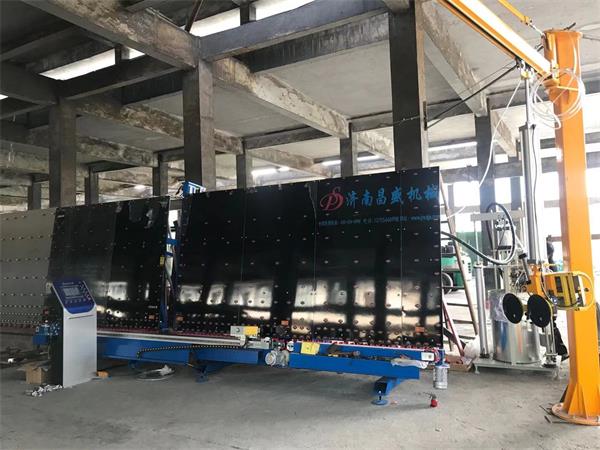

8.前四段相同。內合片、外合片、內外合片三種立式中空玻璃生產線前四段都是一樣的,分為上片段、清洗段、烘干段、玻璃等待段(上鋁框段),這三種類型的配置和功用都是一樣的。不過每個設備廠家在清洗、烘干段在設計和技術上有所不同,比如毛刷的帶動,有的是每根毛刷配一個電機帶動,有的是用皮帶帶動轉輪來帶動,只要轉速達到清洗玻璃的要求,那么哪種帶動都可以。單從節能方面來講,還是皮帶帶動的要好一些。烘干段風刀和風裝置的區別,有的是配置循環內熱風,有的是外吸風經過過濾再加熱裝置來對玻璃進行風干。
The first four paragraphs are the same. The first four stages of the vertical hollow glass production line for inner, outer, and inner and outer laminations are the same, divided into upper section, cleaning section, drying section, and glass waiting section (upper aluminum frame section). The configurations and functions of these three types are the same. However, each equipment manufacturer has different designs and technologies in the cleaning and drying stages, such as the drive of the brush. Some use a motor to drive each brush, while others use a belt to drive the wheel. As long as the speed meets the requirements for cleaning glass, either drive can be used. In terms of energy conservation alone, it is better to drive with a belt. The difference between the air knife and the air device in the drying section is that some are equipped with circulating internal hot air, while others are equipped with external suction air that is filtered and then heated by a device to air dry the glass.
9.第五段中空玻璃生產線的區別。內合、外合、內外合在第五段開始有了變化。內合在第五段是過渡段,而外合、內外合在第五段是個較關鍵的一段,就是在此段合片。該段用于中空玻璃合片,活動板由液壓系統控制、前后移動參數由固定架上的行程開關控制;當靠前片玻璃到達該段末端光電開關時,玻璃減速,同時側定位升起,玻璃到達側定位時即停止。此時活動板后退,碰到后退行程開關時停止。下托起上移,橫梁下移,當橫梁上的光電開關1檢驗到第二片玻璃時橫梁減速下移,當橫梁上的光電開關2檢驗到第二片玻璃時橫梁停止下移;第二片玻璃經過下托起和橫梁上的錐形輪及活動板上的棍子向前輸送,當橫梁末端上的光電開關檢驗到第二片玻璃上,則第二片玻璃減速運行至側定位;下托起下移復位,橫梁上移碰到行程開關后停止;一般在生產前幾片時,踩動腳踏開關,則壓緊氣缸帶壓緊輥將兩片玻璃壓在一起,同時將中空玻璃輸送到壓合段;檢查玻璃合片情況,如玻璃合片良好,則直接打到合片自動上(不用踩動腳踏開關),如此反復。
9. Differences in the fifth section of the insulating glass production line. The internal, external, and internal/external combinations have undergone changes since the fifth paragraph. The internal fusion in the fifth paragraph is a transitional stage, while the external fusion and internal fusion in the fifth paragraph are a more critical stage, which is where the fusion takes place. This section is used for laminating insulating glass, with the movable plate controlled by the hydraulic system and the forward and backward movement parameters controlled by the travel switch on the fixed frame; When the front glass reaches the photoelectric switch at the end of the section, the glass slows down and the side positioning rises. When the glass reaches the side positioning, it stops. At this point, the movable board moves backwards and stops when it touches the reverse travel switch. When the photoelectric switch 1 on the crossbeam detects the second piece of glass, the crossbeam slows down and moves up. When the photoelectric switch 2 on the crossbeam detects the second piece of glass, the crossbeam stops moving down; The second piece of glass is transported forward through the conical wheel on the lower support and crossbeam, as well as the stick on the movable plate. When the photoelectric switch at the end of the crossbeam detects the second piece of glass, the second piece of glass slows down and runs to the side positioning; Lower support, lift, move down, reset, and stop when the crossbeam moves up and touches the travel switch; Generally, in the first few pieces of production, by stepping on the foot switch, the pressing cylinder with a pressing roller presses the two pieces of glass together, while conveying the hollow glass to the pressing section; Check the glass lamination condition. If the glass lamination is good, directly switch to the lamination automatic position (without stepping on the foot switch), and repeat this process.
10.第六段是中空玻璃生產線板壓段。如果是內合片,該段用于中空玻璃的平壓,該段有一個上下的步進電機和8個區的吸盤,能夠很好的控制玻璃的準確合片。平壓過程都由液壓系統控制,合好的中空玻璃平壓段內自動壓實完成,本段的非常大特點是采用玻璃中間定位,可使中空玻璃平行壓緊力均勻,同時改善了設備工作狀況。中間定位的原理是:由進入該段初始光電開關和中間光電開關進行檢驗,將中空玻璃停在中間部位,該段的壓緊力由微動開關控制。如果是內合片或內外合片,該段用于中空玻璃的合片及平壓,兩個過程:中空玻璃生產線SM1800A、SM2200A、SM2500A由液壓系統控制,SM1600由氣動系統控制,在合片平壓段內自動完成,大大減小了整條中空玻璃生產線的結構長度。玻璃由傳送膠輥平托及傳送,傳送輥由電機經過變頻調速后直接帶動,后壓片有氣浮裝置,輔助輸送玻璃;前壓片內裝有吸盤裝置,并漩蝸泵、儲能器及真空發生器增強吸風力,可牢牢吸住玻璃。
The sixth section is the pressing section of the insulating glass production line board. If it is an internal lamination, this section is used for flat pressing of insulating glass. This section has an up and down stepper motor and 8 zones of suction cups, which can effectively control the accurate lamination of the glass. The flat pressing process is controlled by the hydraulic system, and the closed hollow glass flat pressing section is automatically compacted. The major feature of this section is the use of glass middle positioning, which can make the parallel pressing force of the hollow glass even and improve the working condition of the equipment. The principle of intermediate positioning is to inspect the initial photoelectric switch and intermediate photoelectric switch entering the section, stop the insulating glass in the middle, and the compression force of the section is controlled by a microswitch. If it is internal or external lamination, this section is used for lamination and flat pressing of insulating glass. Two processes are controlled by the hydraulic system for the insulating glass production lines SM1800A, SM2200A, and SM2500A, while the pneumatic system controls the SM1600. It is automatically completed in the lamination flat pressing section, greatly reducing the structural length of the entire insulating glass production line. The glass is horizontally supported and transported by a conveyor roller, which is directly driven by a motor through frequency conversion speed regulation. The rear pressing plate is equipped with an air flotation device to assist in transporting the glass; The front pressing plate is equipped with a suction cup device, and a vortex pump, energy storage device, and vacuum generator enhance the suction force, which can firmly suck in the glass.
感謝您的閱讀,此文的文章來源:中空玻璃生產線更多的內容和問題請點擊:http://www.aabrs.cn我們會繼續努力的為您提供服務,感謝您的支持!
Thank you for reading. The source of this article is: Hollow Glass Production Line. For more information and questions, please click on: http://www.aabrs.cn We will continue to work hard to provide you with services. Thank you for your support!
上一篇:丁基膠涂布機使用中如何進行檢測?
下一篇:鋁條丁基膠涂布機使用的特點介紹
相關新聞 moer+
- 雙組份打膠機讓膠水發揮最大威力 2025/04/08
- 臥式丁基膠涂布機的優勢有什么 2025/04/07
- 封膠線麻煩?全自動封膠線了解一下 2025/04/01
- 中空玻璃加工設備:建筑節能革命的核心引擎 2025/03/31
- 中空玻璃生產線的概述 2025/03/28
- 全自動鋁條折彎機安全操作流程 2025/03/24
- 全自動封膠線的好處有哪些? 2025/03/24
- 雙組份打膠機的工作原理和優勢是什么? 2025/03/21
- 全自動鋁條折彎機:鋁加工行業的高效利器 2025/03/20
- 全自動封膠線是工業制造的高效粘結助力! 2025/03/18

 當前位置:
當前位置: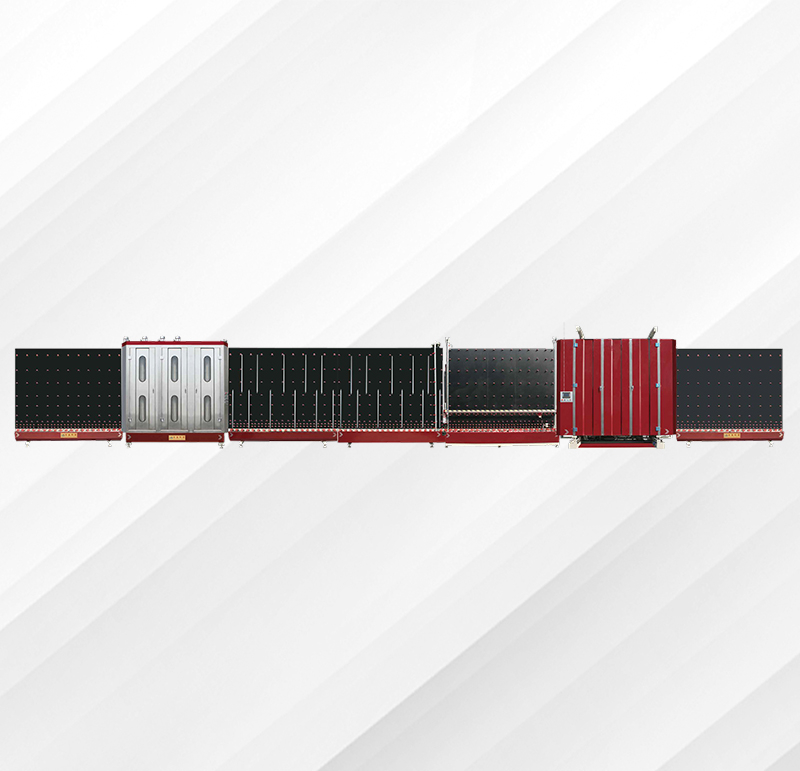
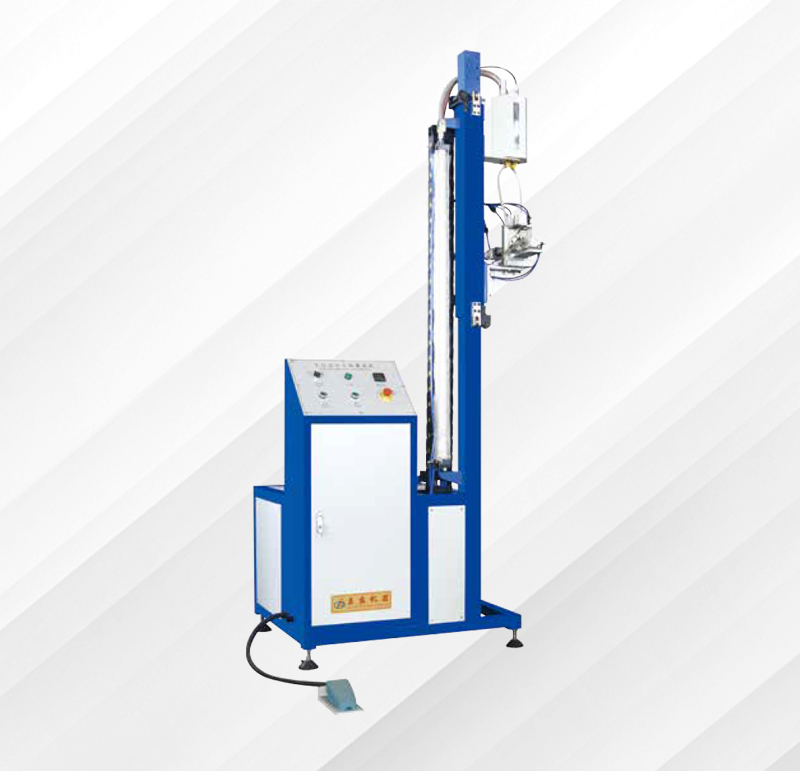
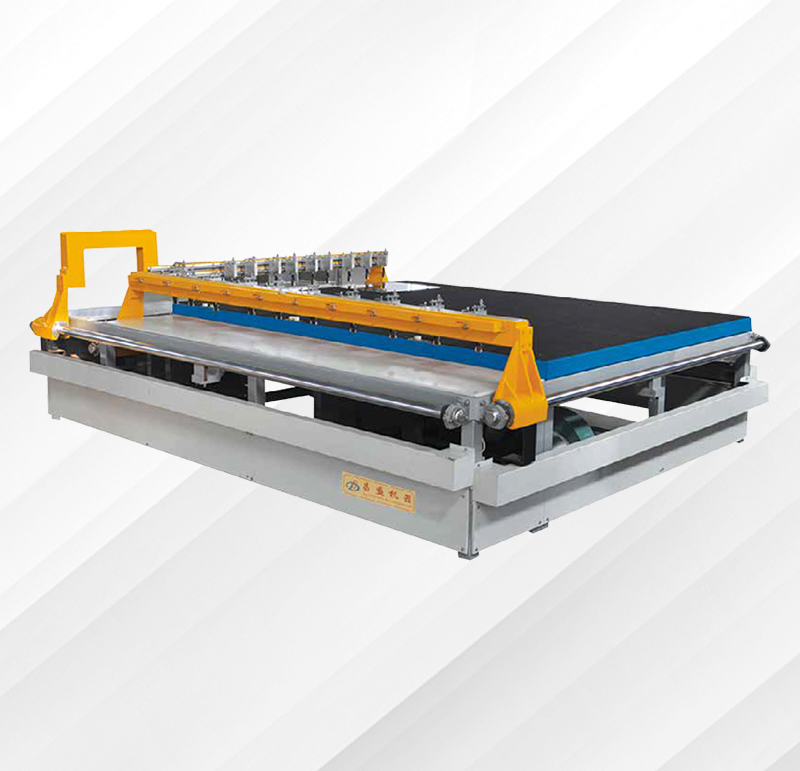
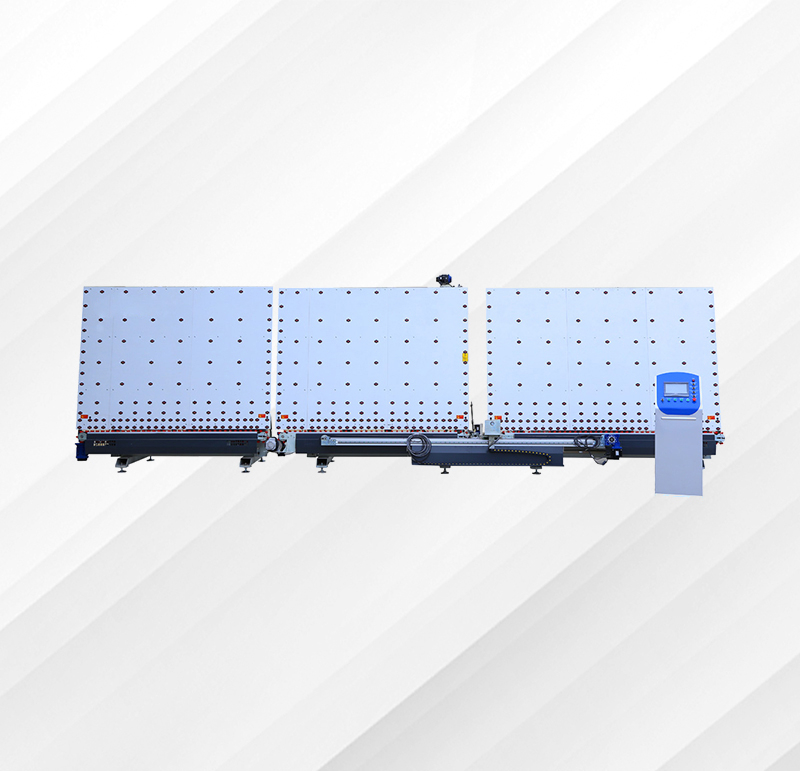
 產品分類Product categories
產品分類Product categories
 聯系我們Contact us
聯系我們Contact us
